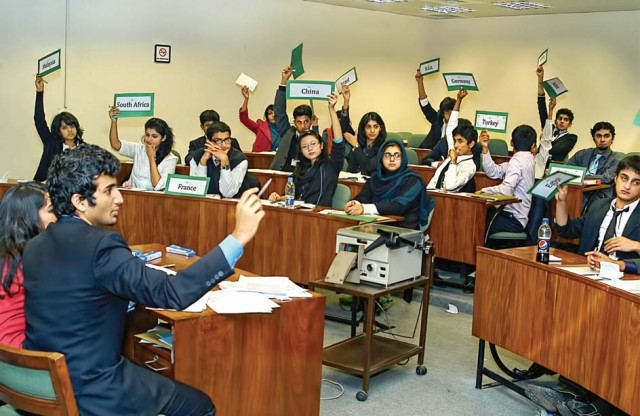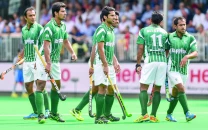LUMUN proceedings: ‘Pakistan’ offers to withdraw troops from Azad Kashmir
Pakistani delegate offers to withdraw troops from Azad Jammu and Kashmir and deploy them to fight the Taliban.

Sixteen committees met in three sessions and some were addressed by Pakistani diplomats on the third day of the conference, which ends today.
At the Special Political and Decolonisation Committee meeting, the Chinese delegate offered to provide significant “military strength” to the UN peacekeeping force in the disputed region of Kashmir if India and Pakistan agreed to hold a plebiscite there. The committee built a framework for potential Pakistan-India peace.
Russia said the process should start with the allies of the two countries pressing them to resume talks called off since the 2008 Mumbai attacks. The UK suggested a long term plan for military withdrawal while South Africa said that disarmament, demobilisation and reintegration of the region were necessary to reach a lasting settlement.
LUMUN patron and former foreign secretary Shaharyar Khan spoke about the genocide in Rwanda, where he served as ambassador, in his lecture to the Historical General Assembly. He said that one million people had been killed in three months in Rwanda. The United Nations had failed to stop it because no African country was a permanent member of the Security Council.
“To eliminate a people on religious or ethnic basis is known as genocide,” he said. He said the Taliban wanted to kill all Ahmedis and Shias, and if Pakistan did not take steps against extremism they would conduct a genocide of both groups.
Veteran diplomats Asim Ahmed, Shamshad Ahmad Khan, Brig Mujahid Alam, Dr Muhammad Faisal, Khalil Hussain, Lt Gen (r) Ghulam Mustafa, Javed Hussain and Iqbal Raza also shared their experiences with various committees.
The third day of the Security Council session was dominated by discussion of how to make the system more democratic.
One reform suggested was to increase the number of non-permanent members for greater regional representation. Some objected that this would make the council more inefficient and less flexible. Nonetheless, there was a consensus that more non-permanent members needed to be inducted before the council could appoint more permanent members.
Delegates proposed that the G4 nations (India, Brazil, Japan and Germany) and two others, preferably from the African Union, be assessed over a period of 5-8 years. Their claim for permanent admission to the Security Council could then be decided on the basis of their economic and military strength, commitment to democracy, and contributions to the UN.
Another point of argument for the committee was whether or not India’s entry to the Security Council as a permanent member should be predicated on a resolution of the Kashmir Issue.
The majority of the committee agreed that India and Pakistan should resolve the Kashmir Issue and sign a treaty for the reduction of nuclear arms.
The Indian delegate argued that the Kashmir Issue was too complex to be resolved overnight. The Pakistan delegate was absent throughout the proceedings, so no agreement could be reached.
At the meeting of the UNIFEM committee, which is meant to work for women’s rights, delegates emphasised the need to establish platforms where women can raise their voices whenever their rights are usurped.
They agreed that a key reason for female poverty in developing countries like Pakistan was that women were not given an education. In Pakistan, cultural norms were confused with religious ones, with people in rural areas generally of the view that women should not be educated. The Austrian delegate proposed that religious figures be sent to rural communities to clarify Islam’s position on the education of girls.
On Sunday, the committees will hold two more sessions where they will finalise their draft resolutions. There will also be a scavenger hunt and closing ceremony where students will be awarded various prizes. The French ambassador will be the chief guest.
Published in The Express Tribune, December 26th, 2010.



















COMMENTS
Comments are moderated and generally will be posted if they are on-topic and not abusive.
For more information, please see our Comments FAQ